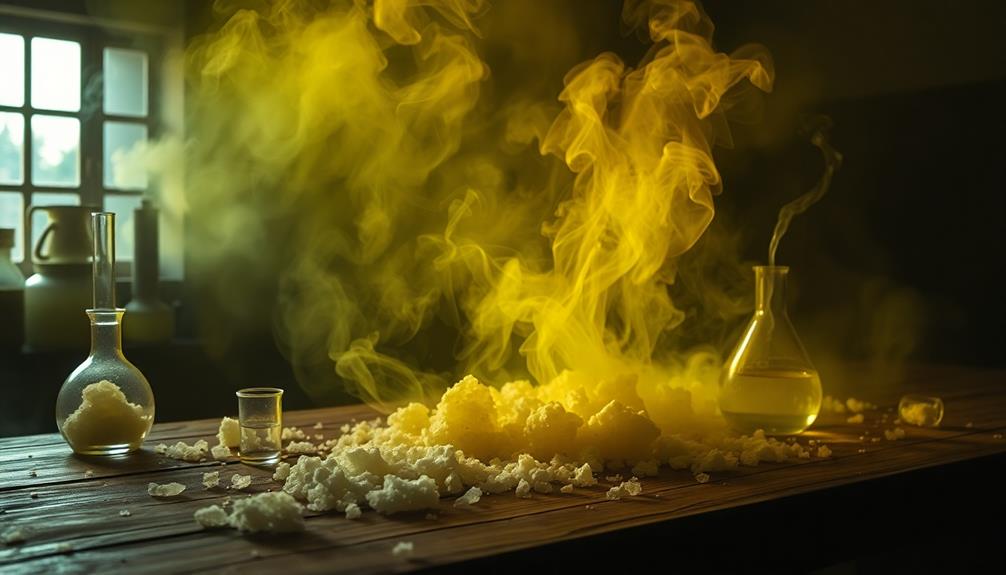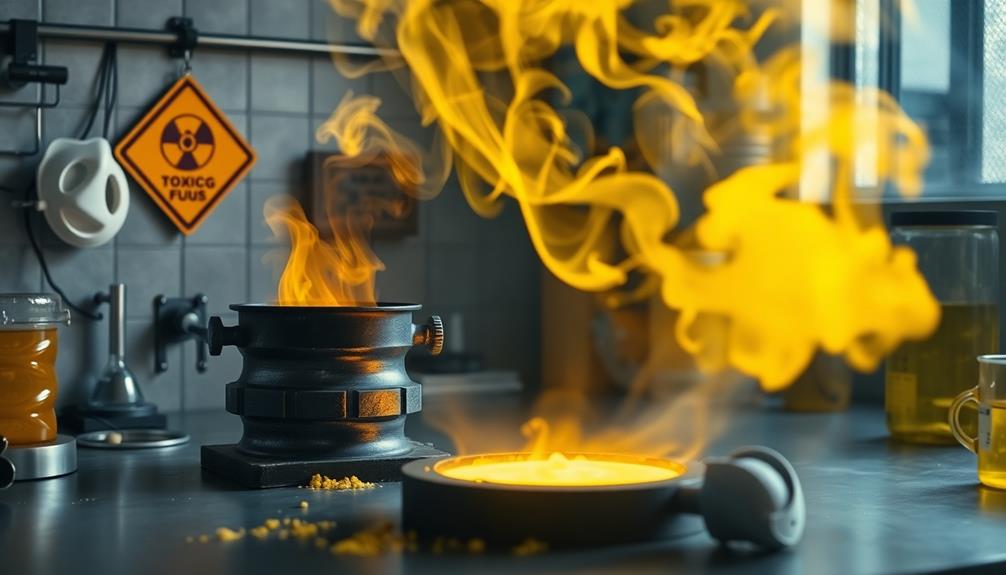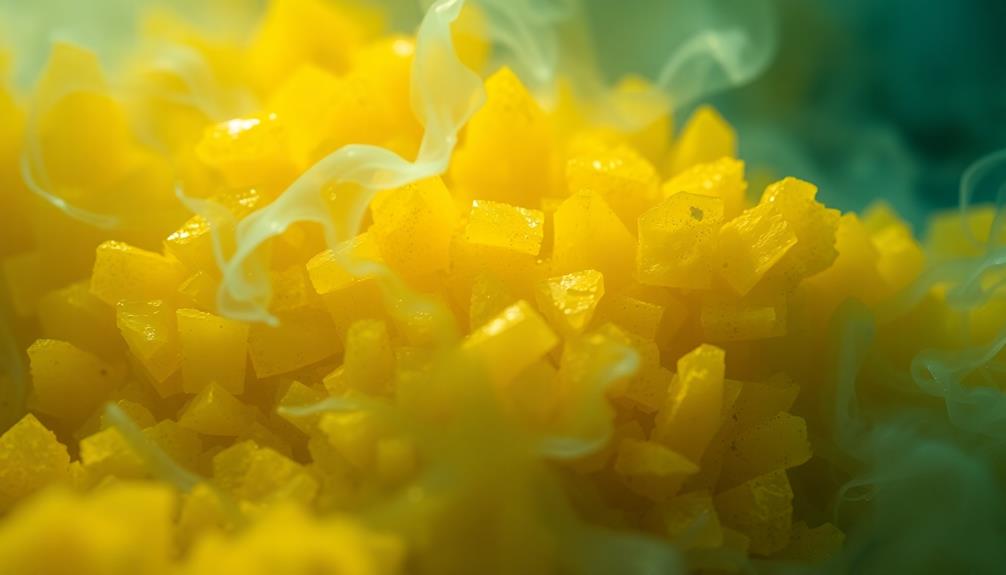Burning sulfur has a strong, unforgettable smell that many people compare to rotten eggs—yikes! It's sharp and acrid, almost like burnt matches, thanks to compounds like sulfur dioxide and hydrogen sulfide. You'll often encounter this scent in industrial settings or during volcanic eruptions. While some might find it a bit disgusting, others see it as a reminder to stay cautious. If you smell burning sulfur, it's wise to get to fresh air, especially if you're sensitive to strong odors. Want to know more about its health effects and how to stay safe? Keep exploring!
Key Takeaways
- Burning sulfur produces a sharp, acrid odor similar to burnt matches, often described as pungent and unpleasant.
- The smell is primarily due to sulfur dioxide ($\ce{SO2}$) and hydrogen sulfide ($\ce{H2S}$), the latter contributing to a rotten egg scent.
- Many individuals can detect sulfur dioxide at very low concentrations, as low as 0.3 parts per million.
- The odor can trigger negative reactions, including nausea and respiratory issues, especially in sensitive individuals.
- Culturally, the smell is often associated with decay, danger, and ominous events, reinforcing its negative perception.
Introduction

The smell of burning sulfur is hard to miss, often evoking memories of rotten eggs due to its pungent odor. When you catch a whiff, it's likely because sulfur dioxide ($\ce{SO2}$) is being released into the air. This gas can be detected at very low concentrations, sometimes as little as 0.3 to 1.4 parts per million, making it quite powerful.
You might even notice hints of hydrogen sulfide ($\ce{H2S}$), which adds to that unmistakable eggy scent. Interestingly, pure sulfur is usually odorless, but when it burns, it forms sulfur oxides that contribute to that irritating smell.
If you're sensitive to odors, you might find that the smell of burning sulfur can be uncomfortable or even cause respiratory issues at higher levels. Some people can detect this smell even at lower concentrations, which makes the experience quite unique to each individual.
In the context of optimal nutrition and flavor, it's important to recognize how our senses, including smell, influence our perceptions of food and its appeal.
Next time you encounter burning sulfur, take a moment to appreciate how this strong smell affects you. It's not just a nuisance; it's a reminder of the complex chemistry happening around us!
Description of the Smell

Experiencing the smell of burning sulfur is often unforgettable, as it instantly reminds you of rotten eggs. This pungent odor arises from the release of sulfur dioxide gas and hydrogen sulfide during combustion. In some cases, the sharp scent may even resemble the unmistakable smell of certain heating systems. You might find the scent sharp and acrid, making your nose wrinkle and your stomach turn.
At incredibly low concentrations, as little as 0.01 parts per million, you can detect hydrogen sulfide, while higher levels of sulfur dioxide can cause discomfort in your throat and lungs.
The distinct smell of burning sulfur is easily recognizable and can trigger negative reactions, especially in individuals sensitive to strong odors. If you've ever walked past a sulfur spring or a volcanic area, you know that feeling—it's hard to ignore!
Even impurities in sulfur can alter the scent slightly, but the typical rotten egg smell remains dominant. As you inhale, the odor can feel overwhelming, almost as if it's wrapping around you like a thick fog.
Whether you're near a science experiment or a natural phenomenon, the experience is unforgettable, leaving a lasting impression that's hard to shake off. For instance, if you encounter this smell in your home, it may indicate a malfunctioning appliance, such as a heat pump that requires immediate attention.
Source and Composition

When sulfur burns, it primarily produces sulfur dioxide (SO₂), a gas known for its sharp, acrid odor reminiscent of burnt matches. This distinctive smell can be quite unpleasant, and it's one of the reasons people notice when sulfur is present in the air.
As sulfur combusts, it can also release hydrogen sulfide (H₂S), which smells like rotten eggs and can be detected even in tiny amounts. Understanding the common financial terms can help you navigate economic discussions that may use sulfur in industrial contexts.
The source of this powerful odor lies in the sulfur compounds that form during combustion. While elemental sulfur itself doesn't have much of a smell, burning it creates various sulfur oxides, contributing to those pungent, recognizable scents.
You'll find that your ability to detect these odors varies; many people can sense sulfur dioxide at concentrations as low as 0.3 to 1.4 parts per million (ppm).
Typical Scenarios or Environments

Burning sulfur often occurs in various industrial and agricultural settings, making it a common experience for many. You might catch a whiff of that pungent, irritating smell when sulfur is used as a pesticide or fungicide on farms.
Imagine walking through a field and suddenly encountering a scent similar to burnt matches—sharp and acrid. It's not just unpleasant; it can also mean sulfur dioxide emissions are entering the air, which can raise health concerns, especially for those with sensitivities.
In industrial areas, burning sulfur can happen during manufacturing processes involving sulfur-based chemicals. This can lead to complaints from nearby communities about air quality issues.
And let's not forget about volcanic eruptions, where the smell can be overwhelming! It's fascinating how these environments can contribute to the formation of acid rain, affecting ecosystems and even our drinking water.
Emotional or Cultural Associations

How do you feel when that sharp, acrid smell of burning sulfur hits your senses? For many, it brings forth negative emotions like disgust and nausea. This odor, often compared to rotten eggs or skunk, can make you recoil.
Culturally, the smell of burning sulfur is linked with ominous events. In literature and religious texts, it signals hellfire or punishment, reinforcing its unsettling reputation.
Think about how this scent appears in movies, too. It often symbolizes decay, danger, or something toxic lurking nearby, which adds to its negative associations.
However, not everyone reacts the same way. Your personal experiences and cultural beliefs might influence how you perceive this pungent smell. For instance, some cultures see sulfur as a purifying agent, using it in fumigation despite its unpleasant aroma.
Health or Safety Considerations

The sharp, acrid odor of burning sulfur isn't just unpleasant; it poses significant health risks. When sulfur burns, it produces sulfur dioxide, which can cause respiratory issues. You might start to cough, feel throat irritation, or even have trouble breathing, especially if you already have asthma or other breathing problems.
It's vital to be aware of these dangers. Additionally, hydrogen sulfide, which smells like rotten eggs, is even more dangerous. At high levels, it can lead to severe health problems, including respiratory failure.
That's why safety measures are so important in places where sulfur is used or burned. The Occupational Safety and Health Administration (OSHA) has established exposure limits to keep workers safe, allowing only 20 parts per million of hydrogen sulfide over an eight-hour period.
Everyone has different sensitivities to these smells. Some people can detect sulfur odors at very low concentrations, which makes monitoring air quality crucial.
Final Thoughts

Understanding the implications of burning sulfur is crucial for your health and safety. When sulfur burns, it produces sulfur dioxide, which has a sharp, irritating smell that many describe as unpleasant. You might think of it as the scent of burnt matches or a strong chemical odor. This smell can be alarming, especially since it can be detected at very low levels, anywhere from 0.3 to 1.4 parts per million.
Besides the unpleasant smell, burning sulfur can create serious health concerns. Prolonged exposure to its fumes can lead to respiratory issues. You don't want to risk discomfort or harm from these irritating compounds.
If you ever encounter burning sulfur, it's wise to take it seriously and move to a well-ventilated area or seek fresh air immediately.
Frequently Asked Questions
What Is the Burning Smell of Sulphur?
You'll notice a strong, pungent smell when sulfur burns, often compared to rotten eggs. This distinctive odor comes from various sulfur compounds released during combustion, which can irritate your respiratory system if inhaled for long periods.
What Is the Smell of Burning Sulfur Dioxide?
When you encounter burning sulfur dioxide, you'll notice a sharp, acrid odor, often compared to burnt matches. It can irritate your lungs, so it's best to avoid prolonged exposure in enclosed spaces.
How Would You Describe the Smell of Sulphur?
You might find the smell of sulfur to be sharp and unpleasant, often reminiscent of burnt matches or rotten eggs. It's a distinctive odor that can irritate your senses and linger in the air.
What Is the Choking Smell of Burning Sulphur?
When you encounter the choking smell of burning sulfur, it's sharp and pungent, reminiscent of burnt matches. This irritating odor can overwhelm your senses, potentially causing discomfort or respiratory issues if you inhale it too deeply.









